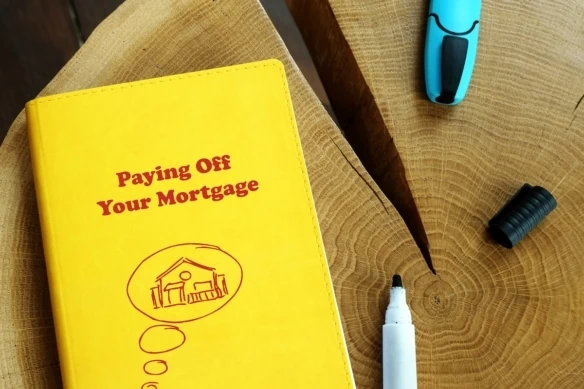Many Americans find themselves at a similar crossroads later in life—they’re a few years away from retirement … but they’re also a few years (or more) away from fully paying off their mortgage.
You might be in the same shoes. Maybe you’re on track to hit both financial goal lines at the same time. Maybe you’re on pace to pay your mortgage for a couple years in retirement, or pay off your mortgage a couple years before you call it a career.
In any of the above scenarios, you’re probably asking yourself: Should I pay off my mortgage before I retire?
There’s no one-size-fits-all answer, but we can give you the tools to help you make the best decision. Today, I’m going to go over some of the reasons you might want to pay off your mortgage early, and then I’ll outline a few of the arguments in favor of sticking to your mortgage schedule.
When It Makes Sense to Pay Off Your Mortgage Early
In some situations, it makes financial (and even psychological) sense to pay off your mortgage debt early ahead of your retirement.
Whether it makes sense also hinges on how you’d pay that debt off early—if you had a large cash windfall you wanted to put to use, or if you just planned to speed up your payments to knock out your mortgage a few months early.
Here are several reasons to retire your mortgage before you retire yourself.
1. You Have a High Interest Rate

Homeowners with a high mortgage interest rate could save a substantial amount of money by accelerating their payoff schedule.
Let’s say that, 27 years ago, you got a 30-year home loan for $300,000 at a 6% interest rate.
If you made normal repayments for the remaining three years, your remaining interest would be about $5,600.
However, if you were sitting on a large sum of money—let’s say you received an inheritance—and paid off the entire remaining balance of roughly $59,100, assuming your mortgage didn’t include a prepayment penalty, you would save about $5,600.
You could still enjoy some savings even if you just paid off the remaining balance more quickly. For instance, let’s say you have three years left on the mortgage, but you want to pay it off by your retirement in two years. If you added $1,000 to your regular monthly payment, you’d have your mortgage paid off in a year and 11 months—and you’d save a little more than $2,100 in interest. Not bad!
Just note in some cases, the math says your money could be better put to use elsewhere.
For instance, the average annual stock market return is roughly 10%, meaning if you put that same $59,100 to work, you’d in theory earn $19,562 in three years—far more than you’d have saved in interest on your 6%-rate mortgage. On the flip side? The 10% average is just that: an average. The stock market isn’t guaranteed to return that much in any given year, and indeed, it could even lose money. (This example doesn’t consider taxes, but you would still come out ahead no matter what federal and state tax brackets you belong to.)
Related: Want to Retire Early? Don’t Make These Mistakes
2. You Want Lower Monthly Expenses

In many cases, a person’s mortgage is their largest monthly liability. If that’s the case for you, then paying off your mortgage won’t just save you a chunk of interest—it will substantially free up your cash flow for other needs and wants.
Obviously, this requires either taking a large amount of savings or a windfall to kill off your mortgage immediately, or sacrificing a few tighter months of higher mortgage payments first to reach your no-mortgage-payment future sooner. But if you can manage it in either scenario, again, you’ll save on interest and you’ll zero out your monthly payment a lot sooner.
Related: Budgeting in Retirement: Our Step-by-Step Guide
3. You Want One Less Thing to Stress About

I mentioned above that paying off your mortgage early might not make the most sense mathematically. But financial decisions aren’t just about money—psychology and emotions are often deeply involved, too.
Mortgage stress is common. And even if you only have a few years’ worth of mortgage payments remaining, there’s still a risk that you suddenly wouldn’t have the means to pay off your debt, and the bank would foreclose on your home. That’s why there are few more relieving feelings than finally paying off your mortgage and officially owning your home.
So, for many people, even if the math says they’d be better off financially by investing their money, they’d be better off mentally by just being done with their mortgage.
But that feeling only goes so far: If you use every single spare dollar you have to pay off your mortgage, or worse, dip into your retirement funds, you’re just trading one financial stressor for another.
Related: 10 Best Fidelity Funds to Buy
When It Doesn’t Make Sense to Pay Off Your Mortgage Early
Just like bigger isn’t always better, sooner isn’t always your best bet, either. There are several good reasons to stick to your current mortgage repayment schedule.
1. You Have High-Interest Debt

Above, I mentioned how it sometimes makes sense to invest, rather than pay off your mortgage, if you could get a higher rate of return than the interest rate on your mortgage.
Similar math applies if you still hold other debt at a higher interest rate than your mortgage.
Mortgage rates tend to be low compared to a few other types of debt—most notably credit cards and personal loans. The vast majority of people have a mortgage rate in the single digits; the average annual percentage rate (APR) on credit cards sits near 23%!
Let’s use our original example. If you spent $59,100 paying off the remaining three years on your 6% mortgage, you would save roughly $5,630. To keep the example simple, if you had the same amount of credit card debt (and we hope you don’t!), at an interest rate of 23%, you’d save a whopping $23,258 in interest payments by paying the card off first.
In most situations, regardless of age, you want to pay off higher-interest debt before lower-interest debt.
Related: 9 Best Fidelity Index Funds to Buy
2. You Don’t Have an Emergency Fund

While it’s often a good idea to make extra mortgage payments, it’s a much riskier strategy if you don’t already have a robust emergency fund.
Most experts recommend having three to six months’ worth of living expenses saved in an interest-bearing account that won’t penalize you for withdrawals. Only after you have ample funds ready in case of an emergency, and enough room in your spending account, should you start to consider increasing your monthly mortgage payment.
If you have a medical emergency, lose your job, or have any other financial issues, an emergency fund ensures you can keep paying the bills. So paying off your entire mortgage when you don’t already have an emergency fund is bad enough, but if you’re merely speeding up mortgage payments and you suddenly hit some bad luck, you could ironically end up falling behind on your remaining regularly scheduled mortgage payments.
Related: 10 Monthly Dividend Stocks for Frequent, Regular Income
3. You’re Behind on Retirement Savings

If your financial planning shows that you’re “behind” on retirement savings and need to contribute more to your retirement accounts, that should be a higher priority than accelerating mortgage payments or paying off the whole enchilada.
The more you contribute to these accounts now, the more retirement income you’ll have when you need it later. More importantly, if you’re using a retirement account (as opposed to a taxable brokerage), that money will enjoy some powerful tax benefits that you simply don’t want to miss out on.
WealthUp Tip: If you’re over age 50, you can add extra money over the regular contribution limits (known as “catch-up contributions”). How much more you can add varies by account type and year.
Related: How to Invest for (And in) Retirement: Strategies + Investment Options
4. You Plan to Move Soon

You might join the swaths of people who consider moving once they retire, for a multitude of reasons. You won’t need to live near your employer anymore. You might want to move somewhere warmer, closer to family, or to an area with a lower cost of living. You might also be an “empty nester” who wants to downsize to a smaller home or you currently live in a state that taxes Social Security benefits and would like them to go untouched.
Whatever your reason, if you’re planning on moving soon, consider stashing your cash rather than using it to pay off your current mortgage. If you’re about to take on a new mortgage in retirement, especially in today’s period of relatively higher mortgage rates, you’ll want to beef up that down payment to limit how much interest you’ll have to pay.
Related: 9 Best Schwab Funds You Can Buy: Low Fees, Low Minimums
5. You Claim the Mortgage Interest Deduction

When you do your taxes, do you take the standard deduction, or do you itemize your tax deductions? If it’s the latter, and you claim the mortgage interest tax deduction in addition to many other itemized deductions, you might be financially better off staying on schedule.
If you have an accountant or regular tax preparer, they can help you determine whether you’d be better off sticking with your mortgage and the mortgage interest deduction, or paying off the mortgage and either continuing to itemize or switching to the standard deduction.
Related: 8 Special Tax Breaks for Senior Citizens
6. You Could Earn More Money in Low-Risk Investments

I mentioned above that the stock market, on average, will typically earn a higher percentage return than the interest you’re paying on your mortgage. But given stocks’ high risk and unknowable year-to-year performance, that’s quite a gamble.
The appeal of putting your money elsewhere is much greater if you’re getting a higher return on a virtually risk-free investment (like savings or a CD) than your mortgage rate.
For instance, if you have three years left at a 4% interest rate but can get 5% on a 36-month CD, you’d need $48,511.27 to pay off the mortgage all at once, and you’d save roughly $3,050 in interest … but you’d make $7,647 in the CD. (And again, while taxes aren’t considered here, this example works out in your favor in virtually all tax situations.)
Related: 7 Best Schwab Index Funds for Thrifty Investors
So, Should I Pay Off My Mortgage Before I Retire?

Naturally, the answer is “it depends on your situation.”
If you find yourself nodding “yes” to all the reasons for or reasons against, you probably have your answer. But it’s possible you identified with reasons both in favor and against paying off your mortgage early. And if that’s the case, I highly recommend speaking with a financial advisor who can analyze your unique financial situation.
Empower, for instance, offers a wealth management plan that provides access to financial advisors for anyone who holds at least $100,000 in assets with the firm. Investors with between $100,000 and $250,000 have access to a team of financial advisors. Those with more than $250,000 have access to two dedicated financial advisors. There are extra benefits for people who invest over $1 million, including lower fees.
- Empower offers both a free set of portfolio, net worth, and cash flow tracking tools, as well as paid asset management service.
- Link Empower to your bank and investing accounts, credit cards, and more to see a single view of useful information and data, including your net worth.
- Empower Advisory Group offers a comprehensive wealth management service known as Personal Strategy. This managed account solution provides clients with discretionary investment management, personalized portfolio construction, and access to financial planning support. Accounts investing $100k to $250k receive unlimited advice and retirement planning help from financial advisors, as well as a professionally managed ETF portfolio with reviews upon request. Higher asset tiers offer access to dedicated advisors, estate planning, and tax specialists, plus additional investment options like access to private equity.**
- Special offer: If you have $100k+ in investible assets, sign up with our link to schedule a free initial 30-minute financial consultation with an Empower professional.
- Free portfolio tracker (Dashboard)
- Free net worth, cash flow, and investment reporting tools (Dashboard)
- Tax-loss harvesting (Personal Strategy)
- Dividend reinvestment (Personal Strategy)
- Automatic rebalancing (Personal Strategy)
- Low investment expense ratios (Personal Strategy)
- High number of investment accounts supported (Personal Strategy)
- High $100k minimum for investment management (Personal Strategy)
- Moderately high investment management fee (0.89% AUM) compared to other online advisors (Personal Strategy)
And remember: This decision doesn’t have to be all-or-nothing. While you can pay off your whole mortgage with a large chunk of savings or lump-sum windfall, you could just pay a little more each month. That would allow you to retire your mortgage a little earlier and save a little in interest, while ensuring you still have liquidity to allocate cash elsewhere if necessary.









